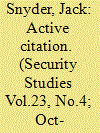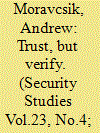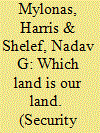|
|
|
Sort Order |
|
|
|
Items / Page
|
|
|
|
|
|
|
| Srl | Item |
| 1 |
ID:
136454


|
|
|
|
|
| Summary/Abstract |
Andrew Moravcsik makes a persuasive case that rigorously executed qualitative methods have a distinctive and indispensable role to play in research on international relations. Qualitative case studies facilitate the tracing of causal processes, provide insight into actors’ understanding of their own motives and assumptions, and establish an interpretive or systemic context that makes unified sense of discrete events. Teamed up with quantitative methods, qualitative methods can check on the presence of hypothesized causal mechanisms that might be difficult to measure in numerical shorthand.
|
|
|
|
|
|
|
|
|
|
|
|
|
|
|
|
| 2 |
ID:
136459


|
|
|
|
|
| Summary/Abstract |
When Britain entered the First World War it did so as an especially hesitant belligerent. One month later, the British enthusiastically signed the Treaty of London, stating that the Entente powers would prosecute the war in common and that none would pursue a separate peace. Why would a state long known for jealously guarding its ability to maintain a free hand initiate a binding alliance that restricted its war termination prospects after one month of combat? And what were the effects of its decision to do so? Answering this question requires not only that we examine British decision making but that we understand No Separate Peace Agreements and why states sign them. I hypothesize that a state will initiate a No Separate Peace Agreement when it has reason to fear that one of its cobelligerents may defect. I also hypothesize that No Separate Peace Agreements will cause states to reconcile war aims with their allies, agreeing to different terms of peace than might have been necessary to satisfy any one of them individually. Using new archival documents, I analyze a case study of British decision making in the early weeks of World War I and find substantial support for the hypotheses.
|
|
|
|
|
|
|
|
|
|
|
|
|
|
|
|
| 3 |
ID:
136455


|
|
|
|
|
| Summary/Abstract |
This article examines the international effects of a variable that has yet to be studied in a systematic manner in the international relations literature: the number of prominent, distinct ideological groups that are present in a particular system, which is a variable that I label “ideological polarity.” My basic argument is that systems in which the great powers are divided into one, two, or three or more ideological groups (or “ideological unipolarity,” “ideological bipolarity,” or “ideological multipolarity,” respectively) have very different dynamics, including major variations in overall threat perceptions among the great powers and the efficiency of the balancing process against perceived dangers. The effects of ideological polarity explain key outcomes that analyses based on power polarity cannot. I test the argument by examining great power relations in two cases: the decades after the Napoleonic Wars and the years leading up to the Second World War. Both periods were multipolar in terms of power but varied in terms of ideological polarity. The result was significant variations in states’ core security policies for reasons consistent with the argument.
|
|
|
|
|
|
|
|
|
|
|
|
|
|
|
|
| 4 |
ID:
136457


|
|
|
|
|
| Summary/Abstract |
In times of war, the routes to innovation are often brutally radical instead of starry-eyed and fantastical. Still, compared with all the hype and hoopla about revolutionary technologies, little scholarly ink has been spilled over these “low-end” military innovations. “Field mods,” as they are often called, are not the sexy computerized drones and robotic sensations we associate with military innovation. This article recovers the process by which one such military innovation was created and argues that the seemingly bottom-up process of Gun Truck development was in fact a dialectical outcome that emerged from two different suborganization types: a learning organization and a bureaucratic stasis model. The findings from the case carry implications for innovation theory, our understanding of the nature of military organizations in war, and the challenge of technological change in wartime.
|
|
|
|
|
|
|
|
|
|
|
|
|
|
|
|
| 5 |
ID:
136458


|
|
|
|
|
| Summary/Abstract |
In times of war, the routes to innovation are often brutally radical instead of starry-eyed and fantastical. Still, compared with all the hype and hoopla about revolutionary technologies, little scholarly ink has been spilled over these “low-end” military innovations. “Field mods,” as they are often called, are not the sexy computerized drones and robotic sensations we associate with military innovation. This article recovers the process by which one such military innovation was created and argues that the seemingly bottom-up process of Gun Truck development was in fact a dialectical outcome that emerged from two different suborganization types: a learning organization and a bureaucratic stasis model. The findings from the case carry implications for innovation theory, our understanding of the nature of military organizations in war, and the challenge of technological change in wartime.
|
|
|
|
|
|
|
|
|
|
|
|
|
|
|
|
| 6 |
ID:
136453


|
|
|
|
|
| Summary/Abstract |
Discussion about greater openness in the policymaking and academic communities is emerging all around us. In February 2013, for example, the White House issued a broad statement calling on federal agencies to submit concrete proposals for “increasing access to the results of federally funded scientific research.”1 The Digital Accountability and Transparency Act passed the US House of Representatives on 18 November 2013 (it has not yet been voted on in the Senate).2 In academia, multiple questions are arising about how to preserve and make accessible the “deluge of (digital) data” scientific research produces and how to make research more transparent.3 For instance, on 13–14 June 2013, a meeting to address “Data Citation and Research Transparency Standards for the Social Sciences” was convened by the Inter-university Consortium for Political and Social Research (ICPSR) and attended by opinion leaders from across the social science disciplines.4 In November 2014, ICPSR hosted “Integrating Domain Repositories into the National Data Infrastructure,” a follow-up workshop that gathered together representatives from emerging national infrastructures for data and publications.
|
|
|
|
|
|
|
|
|
|
|
|
|
|
|
|
| 7 |
ID:
136452


|
|
|
|
|
| Summary/Abstract |
Research transparency is an idea that is easy to love in principle. If one accepts the logic behind emerging transparency and replication standards in quantitative research, it is hard not to agree that such standards should also govern qualitative research. Yet the challenges to transparency in qualitative research, particularly on security studies topics, are formidable. This article argues that there are significant individual and collective benefits to making qualitative security studies research more transparent but that reaping these benefits requires minimizing the real and expected costs borne by individual scholars. I focus on how scholars can meet emerging standards for transparency without incurring prohibitive costs in time or resources, an important consideration if transparency is to become a norm in qualitative security studies. In short, it is possible to achieve transparency without tears, but only if perfection is not the enemy of the good.
|
|
|
|
|
|
|
|
|
|
|
|
|
|
|
|
| 8 |
ID:
136451


|
|
|
|
|
| Summary/Abstract |
Qualitative analysis is the most important empirical method in the field of international relations (IR). More than 70 percent of all IR scholars conduct primarily qualitative research (including narrative case studies, traditional history, small-n comparison, counterfactual analysis, process-tracing, analytic narrative, ethnography and thick description, discourse analysis), compared to only 20 percent whose work is primarily quantitative. Total use is even more pervasive, with more than 85 percent of IR scholars conducting some qualitative analysis.1 Qualitative analysis is also unmatched in its flexibility and applicability: a textual record exists for almost every major international event in modern world history. Qualitative research also delivers impressive explanatory insight, rigor, and reliability. Of the twenty scholars judged by their colleagues to have “produced the best work in the field of IR in the past 20 years,” seventeen conduct almost exclusively qualitative research.2 Moreover, controlled studies reveal that experts on world affairs whose analyses are informed by more eclectic theory and the myriad “situational facts of each historical episode” (a mode in which qualitative analysis excels) tend to predict future events significantly better than those who seek to predict future events using average tendencies and abstract theory (hallmarks of formal and quantitative analysis). To borrow Tolstoy's famous metaphor, “foxes” consistently outperform “hedgehogs.”3 No wonder scholars hold a widespread conviction that qualitative analysis is more policy relevant than any other type of IR scholarship.
|
|
|
|
|
|
|
|
|
|
|
|
|
|
|
|
| 9 |
ID:
136456


|
|
|
|
|
| Summary/Abstract |
Why do stateless nationalist movements change the area they see as appropriately constituting the nation-state they aspire to establish? This article draws a number of hypotheses from the literature on nationalism and state formation and compares the predictions of each about the timing, direction, and process of change to the empirical record in two stateless national movements in the post-Ottoman space: Fatah and the Macedonian Revolutionary Organization. Based on this investigation, the article argues that shifts in the areas stateless nationalist movements seek as their nation-states occur as a byproduct of the politically competitive domestic environment in which these movements are embedded. As nationalist movements engage in the competition for mundane power and survival, their leaders may alter their rhetoric about the extent of the desired national state to meet immediate political challenges that are often only loosely related to territorial issues. If these, initially tactical, rhetorical modulations successfully resolve the short-term challenges that spurred their adoption, they can become institutionalized as comprising the new territorial scope of the desired national state.
|
|
|
|
|
|
|
|
|
|
|
|
|
|
|
|
|
|
|
|
|